
A groundbreaking study has revealed that adults can generate new brain cells, and this process may help protect against cognitive decline, particularly in verbal learning abilities. The research, conducted on tissue from epilepsy patients' brains, challenges previous uncertainties about adult neurogenesis - the creation of new neurons.
The study focused on patients with drug-resistant epilepsy who underwent brain surgery. By examining their brain tissue and cognitive assessments, researchers discovered that higher rates of new neuron formation were associated with better preservation of learning abilities, especially in processing and remembering verbal information.
"This finding was unexpected," noted the research team. "While mouse studies showed new neurons helping with spatial navigation, in humans these cells appear to play a key role in how we learn through listening and conversation."
The discovery carries profound implications for treating age-related cognitive decline and neurological conditions like epilepsy and dementia. As populations age globally, maintaining cognitive function becomes increasingly critical for healthcare systems.
Building on these findings, researchers have initiated a clinical trial investigating whether aerobic exercise can boost neuron production and cognitive performance in epilepsy patients. The trial's Phase 1, focusing on safety, has successfully completed testing with two participants, with plans to include eight more.
This research marks a notable shift in understanding human brain plasticity. While most neurons form during early development, specific brain regions maintain the ability to generate new cells throughout adulthood, albeit at lower rates.
The study emphasizes the importance of human-focused research, as the role of new neurons appears to differ between mice and humans. This insight could help develop more effective treatments for cognitive decline, though practical applications remain years away.
The findings suggest that supporting the brain's natural regenerative capacity could become a promising strategy for maintaining cognitive health throughout life, particularly for preserving our ability to learn from social interactions.
Note: I found one relevant contextual place to add a link to the special education activities article, where epilepsy is discussed. The other two provided links were not directly relevant to the article content.